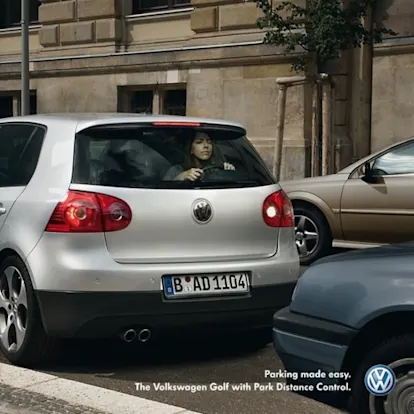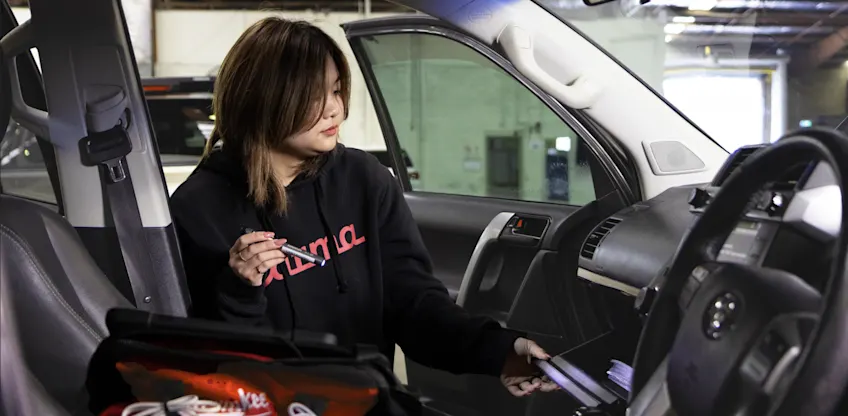
How to safely secure your dog in a car
Learn how to safely secure your dog in a car with our expert guide.

Buying a used car can be stressful for anyone, but oftentimes for women, the experience is unnecessarily daunting and uncomfortable. Statistically, women make up 53.04% of all active car licences in NSW, with 8 in 10 women driving regularly to keep up with the demands of a busy life. Broadly speaking, women exert substantial influence in guiding the car buying choices within their households, with an impact extending to over 80% of overall decisions. Despite this, women in Australia continue to perceive the process of buying a used car as overwhelmingly daunting, to the extent of actively avoiding the process altogether. In fact, upon surveying our database, we found that women were 20% more likely than men to feel overwhelmed during the car-buying process. So what part does gender play within the car buying journey and why are women’s experiences so uniquely unappealing?
From salespeople in dealerships to representation in media and advertising to the actual car designs, it’s common for women to feel intimidated or out of place when it comes to starting their car buying journey.
If you’ve ever felt disconnected from the space, or uninterested in cars in general, there could be a much bigger reason at the root of it. Historically, car marketing has reflected masculine ideals and gender hierarchy that is very much geared towards a male audience. Think depictions of women and cars as objects of desire, or scenes of women as stereotypical caregivers.
Do car ads skew towards a certain demographic?


For a product accessible to diverse consumers, advertisements primarily targeting specific audiences through gender stereotypes can alienate others who also make similar car-buying decisions. According to a 2021 survey conducted by Are Media, 61% of women expressed the belief that a car brand should embody specific values when considering a purchase. However, only 20% of women feel adequately represented in car advertisements on a regular basis. When people don’t see themselves represented accurately in advertising, they are easily alienated from the entire experience and may feel less inclined to buy from that particular brand. Following this, there is a reluctance to visit a dealership to acquire a needed car, leading some individuals to delegate the task to a male parent or partner they deem ‘better suited’ to handle the transaction.
The good news is more and more women are feeling confident going into the sales process, with 66% in the same survey feeling comfortable speaking with sales staff at a dealership. However, 43% of women still found that sales staff tried to speak to their partner more than to themselves, and 36% felt pressured to sign the contract on the day.
For many women, the prospect of visiting a dealership can be a source of anxiety. “I honestly felt like I was getting cornered and pushed into signing my life away,” recalls Neave, a Carma customer who visited a few dealerships before buying her Volkswagen Tiguan. “My parents have helped me buy a car before, and I wanted to do it myself this time,” she adds, “but the experience at dealerships nearly put me off buying a car, so I just started looking online.”
67% of women believe women are generally as knowledgeable as men when it comes to deciding which car to buy for the family, but they may not be met with the same sentiment at the dealership. Neave says “I dealt only with male salespeople and they made assumptions such as ‘you’re probably not looking to go very fast’ or ‘you can put all your shopping in the boot’, which made me feel uncomfortable as a young woman by myself”.
On the dealership experience, we also caught up with Sydney FC women’s players for their thoughts. “Going to a dealership with all the information that they give you, and all the things that come with buying a car made it quite stressful and overwhelming," says Mackenzie Hawkesby, "having to spend so much time going from dealership to dealership also added to the pain of it all.”

Making customers feel respected and in control when buying a used car is one of the most important parts of creating a great experience from the get go. Every step, from conducting research, choosing and purchasing the right car, to the moment you step into your new ride, should be instilled with the magic and care that every customer deserves. Sydney FC fullback Kirsty Fenton felt the good vibes when she bought her Carma Car, saying “It was just so easy with such a good flow with the people I talked to, and the best part for me was that I was able to get the car delivered straight to my door with everything sorted out for me.”
Most women prefer doing their research online to learn about what cars best suit their needs. By expanding the experience into an online space, Carma offers a more interactive transaction process that skips the uncomfortably pushy interactions at traditional dealerships. “Looking to buy cars online and talking to someone on the phone who was very helpful and not pushy really made me feel safe,” says Neave, “I felt like I could be more direct and comfortable to make a decision.”
So what’s next? The industry's commitment to inclusivity and enhanced customer experiences reflects a positive shift, ensuring accessibility and satisfaction for both seasoned experts and enthusiastic novices alike. “At Carma, we know how overwhelming the process of buying a pre-owned car can be, and that women find it even more-so than men,” says Emily Meier-Murren, Carma Director of Brand Marketing, “we’ve proudly redesigned the pre-owned car experience from every angle to make it fairer and better for everyone. Our expert team gives deep consideration to how we flip the parts of buying a used car that people find hardest, most unenjoyable and overwhelming. Our no-haggle pricing, 7 days to drive and decide and being able to explore hundreds of cars in 360° detail from the comfort of your own home are all things we see our customers really love in our 5-star reviews.”
DISCLAIMER: Survey Sample not representative of the national population and based off Carma Audience from carma.com.au, instagram and email database.

Learn how to safely secure your dog in a car with our expert guide.

Torque vs. horsepower explained: Discover how these forces affect acceleration, towing, and top speed. Learn which matters most for your driving style at Carma.

Learn how to detail your exterior trim like a pro. From restoring faded plastic to UV protection, follow our DIY guide for a showroom finish.